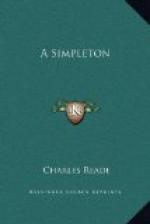The womanly nurse’s heart yearned over her child; for he was feeble as a child; and, when he got well enough to amuse his weary hours by making love to her, and telling her a pack of arrant lies, she was a ready dupe. He was to marry her as soon as ever his old uncle died, and left him the means, etc., etc. At last he got well enough to leave her, and went away, her open admirer and secret lover. He borrowed twenty pounds of her the day he left.
He used to write her charming letters, and feed the flame; but one day her father sent her up to London, on his own business, all of a sudden, and she called on Mr. Falcon at his real address. She found he did not live there—only received letters. However, half-a-crown soon bought his real address, and thither Phoebe proceeded with a troubled heart, for she suspected that her true lover was in debt or trouble, and obliged to hide. Well, he must be got out of it, and hide at the farm meantime.
So the loving girl knocked at the door, asked for Mr. Falcon, and was shown in to a lady rather showily dressed, who asked her business.
Phoebe Dale stared at her, and then turned pale as ashes. She was paralyzed, and could not find her tongue.
“Why, what is the matter now?” said the other, sharply.
“Are you married to Reginald Falcon?”
“Of course I am. Look at my wedding-ring.”
“Then I am not wanted here,” faltered Phoebe, ready to sink on the floor.
“Certainly not, if you are one of the bygones,” said the woman, coarsely; and Phoebe Dale waited to hear no more, but found her way, Heaven knows how, into the street, and there leaned, half-fainting, on a rail, till a policeman came, and told her she had been drinking, and suggested a cool cell as the best cure.
“Not drink; only a breaking heart,” said she, in her low, mellow voice that few could resist.
He got her a glass of water, drove away the boys that congregated directly, and she left the street. But she soon came back again, and waited about for Reginald Falcon.
It was night when he appeared. She seized him by the breast, and taxed him with his villany.
What with her iron grasp, pale face, and flashing eyes, he lost his cool impudence, and blurted out excuses. It was an old and unfortunate connection; he would give the world to dissolve it, if he could do it like a gentleman.
Phoebe told him to please himself: he must part with one or the other.
“Don’t talk nonsense,” said this man of brass; “I’ll un-Falcon her on the spot.”
“Very well,” said Phoebe. “I am going home; and, if you are not there by to-morrow at noon”—She said no more, but looked a great deal. Then she departed, and refused him her hand at parting. “We will see about that by and by,” said she.
At noon my lord came down to the farm, and, unfortunately for Phoebe, played the penitent so skilfully for about a month, that she forgave him, and loved him all the more for having so nearly parted with him.




